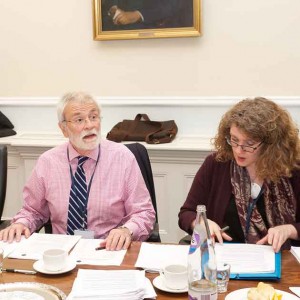 A heated debate on the cost of registering with the General Optical Council has resulted in higher fees for optical professionals but the regulator knows it must now improve its disciplinary process and evolve standards.
A heated debate on the cost of registering with the General Optical Council has resulted in higher fees for optical professionals but the regulator knows it must now improve its disciplinary process and evolve standards.
The registration fee was set at £310 for 2015/16, an increase of £20 for optometrists, dispensing opticians and bodies corporate. It follows a £30 rise for registrants last year after three years without increase.
Rising numbers of fitness to practise (FTP) complaints have been reaching the GOC, which has strived to make its FTP system more efficient through new rules introduced in April (News 04.04.14). The new rules included appointing case examiners and were designed to reduce the workload of the investigation committee.
At its final Council meeting of the year in London last week, GOC chair Gareth Hadley said the organisation was mindful of the financial strain on registrants. In addition to FTP performance targets, IT infrastructure and research projects were added costs for the GOC, which also continued to look for more suitable office facilities than its current Harley Street headquarters.
The £25 cost of registration for students was frozen, while the low income fee for those earning under £12,000 was also increased by £20, to £210.
Hadley said: ‘I’d like to assure all of our registrants that we remain as determined as ever to work efficiently and minimise the burden of the fee. But we must always ensure we have the resources we need to carry out our job of protecting the public.
‘This year’s increase is partly down to inflation but it also reflects the work we are doing to protect the public and be fair to registrants. In common with most of the other healthcare professional regulators we have again seen a significant increase in the number of FTP complaints we receive. It is absolutely imperative that this increase does not stand in the way of our continued efforts to speed up the FTP process, in the interests of patients and registrants alike.’
In the first six months of the financial year the median end-to-end time to deal with FTP complaints had been reduced to 83 weeks, compared 99 in 2012/13. However, Hadley said there was much further to go in meeting the government’s expectations to drive the figure down further.
He added: ‘We hope too that whoever forms the next government after the general election passes the Law Commissions’ draft Bill on the future of healthcare regulation. As well as speeding the FTP process up some of the legislative change in the draft Bill will help us to make significant cost savings – particularly the possibility of introducing threshold criteria to close minor cases early, preventing them from delaying more serious matters.
‘We will continue to work with other regulators to push for the Bill, which may help us to achieve savings in the future. In the present though, we need to ensure we are sufficiently resourced for next year, which is why we have set the registration fee at £310.’
Also at the meeting, Nockolds Solicitors provided an indication of the level of complaints it had received since taking over the Optical Consumer Complaints Service (OCCS) under a GOC contract in April of this year. Initially, 17 complaints were transferred from the previous contractors, followed by 285 more complaints fielded by Nockolds in the past six months.
The newly formed OCCS had managed to conclude 94 per cent of these complaints within 45 days. A fifth of patients had yet to complain to the practice when they contacted the OCCS, while some made the phone call directly from the practice they were aggrieved with. The most common complaints included non-tolerance of varifocal lenses, disputes over taking a prescription to a different dispenser and poor customer service, representatives from the service added.
Also on the agenda at the GOC meeting were stakeholder responses to its standards review, which in part noted how scopes of practice might change throughout the UK in coming years. This was due to changes in technology, an ageing population and increased pressure on the NHS, the GOC stated.
Indeed, 10 respondents to the review felt that optometrists could focus more on eye health and shared-care pathways with other healthcare professionals. Meanwhile, seven respondents said that dispensing opticians could expand their scope of practice in areas such as sight testing, refraction, dispensing for low vision patients, rechecking prescriptions, behavioural vision therapy and colorimetry.
The GOC was to use the responses, which also covered promoting high standards, ethics, the Francis Inquiry and CET, to form the basis of potential new standards for consultation being presented to Council in February 2015.
The GOC last week paid tribute to members James Russell and Morag Alexander following their final Council meeting before their terms end in the new year. Each will have served as members for eight years and were presented with gifts by Gareth Hadley.
